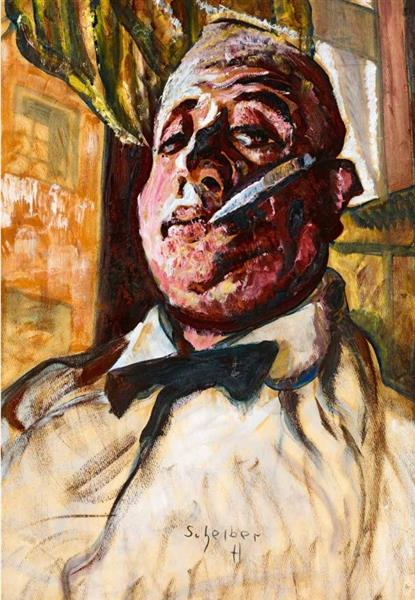Description
The work "Önarckép Csokornyakkend? Vel - 1922", one of the most intriguing self -portraits of Hugó Scheiber, reflects the uniqueness of his style and his acute perception of the world that surrounded him. In this painting, Scheiber offers us an intimate vision of himself, but through a lens that distorts and synthesizes human forms in a coloristic and compositional harmony characteristic of European modernist art of the early twentieth century.
Scheiber, born in Budapest in 1873, was a key representative of Hungarian modernism, influenced by the most avant -garde movements of his time, such as futurism and expressionism. In "Önarckép Csokornyakkend? Vel - 1922", your mastery to absorb and reinterpret these artistic currents is evident.
The composition of this self -portrait is inscrutable and fascinating at the same time. Scheiber represents himself with a fine sense of dynamism and color. The bluish and pink tones predominate, in a game of lights and shadows that highlights the central figure: Scheiber himself, with an attitude that seems of introspection but also of affirmation. The choice of color is not arbitrary; Blue nuances contribute a sense of serenity and depth, while energetic pinks and reds give life and passion to painting, contrasting effectively with those colder tones.
As for the figure, Scheiber portrays with a particular appearance: a tilted hat and a bow tie that gives name to the work. These elements not only define their physical appearance but also capture some of their multifaceted personality. The inclined hat suggests a certain elegance, perhaps a bohemian touch, of someone who lives not only for himself but also for his art. The bow tie, a symbol of refinement and style, provides a sense of individuality and creative pride.
One of the most striking aspects is the stylization of Scheiber's facial features, which gives self -portrait an almost caricaturesca quality. Big eyes, well outlined, seem directly to observe the viewer, full of life and curiosity. The game of lines and colors around the face adds a visual rhythm that keeps the look of the observer in constant movement, remembering the dynamic style of futurism.
This self -portrait is also significant due to the historical context in which it was created. The 1920s was a period of great changes and experiments in art, marked by the impact of World War I and the imminent arrival of new ideologies and technologies. Scheiber, like many other artists of his time, was influenced by these changes, which is reflected in the freedom with which he addresses the composition and the use of color.
The Scheiber technique, notoriously expressive, makes "Önarckép Csokornyakenye? Vel - 1922" in a work that is not only a physical and also emotional and psychological representation. Here, the self -portrait transcends the mere reproduction of reality to become a mirror of the artist's soul, full of introspection and self -understanding.
In summary, "Önarckép Csokornyakkend? Vel - 1922" is a work that captures the essence of modernism and the restless and experimental spirit of Hugó Scheiber. It is a durable testimony of Scheiber's undisputed talent and its ability to merge form and emotion in a visual symphony that continues to resonate strongly today.
KUADROS ©, a famous paint on your wall.
Hand-made oil painting reproductions, with the quality of professional artists and the distinctive seal of KUADROS ©.
Art reproduction service with satisfaction guarantee. If you are not completely satisfied with the replica of your painting, we refund your money 100%.

